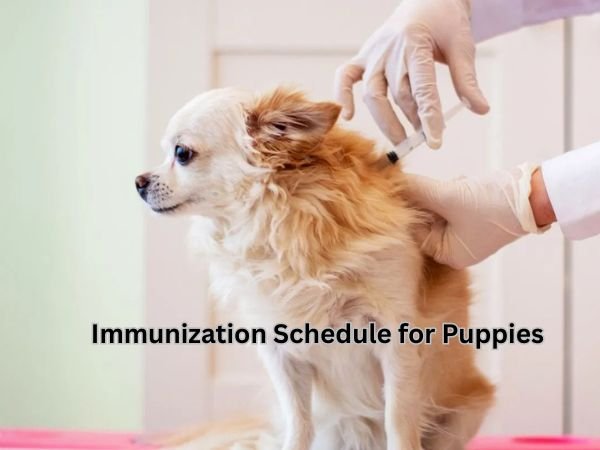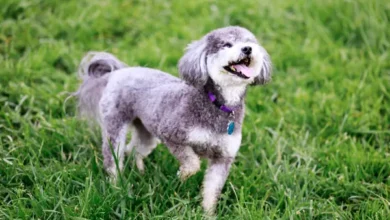
Bringing a new puppy home is one of life’s greatest joys — their playful barks, wiggly tails, and curious eyes instantly capture our hearts. But behind all the fun and cuddles lies an important responsibility: protecting your pup from preventable diseases. One of the most essential parts of raising a healthy dog is ensuring they receive the right vaccinations at the right time. Following the proper Immunization Schedule for Puppies not only shields them from serious illnesses like parvovirus and rabies, but also lays the foundation for a lifetime of wellness.
In this article, we’ll walk you through six crucial steps every pet parent should follow to keep their puppy’s immune system strong and their tail wagging. Whether you’re a first-time owner or just need a refresher, these tips will help give your furry friend the healthiest start possible.
What Are Puppy Vaccinations?
Puppy vaccinations, or “puppy vaccines,” are shots that protect your new furry friend from dangerous diseases. These small but mighty injections help train your puppy’s immune system to fight off infections—just like a superhero’s first lesson in defense. Vaccinations are a simple, effective way to keep your puppy healthy from the start.
Core and Non-Core Vaccines: What’s the Difference?
Not all vaccines are the same. Veterinarians group them into:
Core Vaccines
These are essential for every puppy, no matter where you live or what your lifestyle is. Core vaccines shield against the most serious and common diseases:
- Distemper: A virus that affects the lungs, brain, and gut—often deadly for puppies.
- Parvovirus: A highly contagious stomach virus that can be fatal.
- Adenovirus (Canine Hepatitis): Impacts the liver, eyes, and kidneys.
- Rabies: A fatal disease for both dogs and humans, required by law in many places.
Non-Core Vaccines
These “optional” shots depend on your puppy’s risk. Factors like where you live, your indoor/outdoor habits, and your vet’s advice matter. Examples include:
- Bordetella (Kennel Cough): Important if your puppy will be around other dogs.
- Lyme Disease: Needed in tick-heavy areas.
- Leptospirosis: Recommended if your area has wildlife or standing water.
Why Is a Vaccination Schedule Essential for Puppies?
Puppies are born with some protection from their mothers, but this fades quickly. Their early immune system is still learning and can’t fight off all illnesses alone.
A proper puppy vaccination schedule:
- Provides Timely Protection: Vaccines are given every few weeks, usually starting at 6-8 weeks of age, to build immunity layer by layer.
- Prevents Deadly Diseases: Without regular shots, puppies are at high risk for infections like parvo, distemper, and rabies.
- Protects Others, Too: Vaccinated puppies help keep other pets—and even people—safe from infectious diseases.
What Can Happen If You Skip Vaccines?
It’s heartbreaking to see a playful pup suddenly struck by a preventable illness. Puppies that miss their vaccines can become very sick or even die from diseases like parvo or distemper. Treating these diseases can be expensive and not always successful.
Actionable Advice
- Consult Your Vet Early: Schedule your puppy’s first checkup right away.
- Stick to the Schedule: Mark your calendar for each round of shots. Missing doses can leave gaps in protection.
- Ask About Your Puppy’s Needs: Every puppy is unique. Your vet can help you decide which non-core vaccines are right, based on your lifestyle.
Wrap-Up
By sticking to a simple immunization schedule, you’re giving your puppy the best start in life. Puppy vaccines don’t just protect your pet—they also bring peace of mind to your whole family. Investing a little time now means more tail wags and fewer worries tomorrow.
Understanding the Immunization Schedule for Puppies
Welcoming a puppy into your life is both exciting and a little overwhelming. One of the most important things you can do as a new pet parent is to keep your puppy healthy—starting with the right vaccinations. Vaccines protect your puppy from serious diseases and help set them up for a happy, healthy life.
Why Puppy Shots Matter
Just like children, puppies need an immune boost when they’re young. Their immune systems are still developing, making them more vulnerable to illnesses. Getting your puppy vaccinated helps protect them and other dogs they meet at the park, puppy classes, or on walks.
Puppy Vaccination Timeline: What to Expect
Your veterinarian will recommend a series of shots during your puppy’s first year. Here’s a simple outline you can expect for the standard puppy vaccination timeline:
6–8 Weeks Old: The First Round
- Distemper
- Parvovirus
- Sometimes parainfluenza or combinations (known as the DHPP vaccine)
10–12 Weeks Old: Time for Boosters
- 2nd round of DHPP (Distemper, Hepatitis, Parainfluenza, Parvovirus)
- Leptospirosis (may be added, depending on your area and veterinarian’s advice)
14–16 Weeks Old: Last Puppy Boosters
- 3rd round of DHPP
- Rabies
- Sometimes a second Leptospirosis shot or Bordetella (kennel cough), especially if your puppy will be socializing or boarding
Around 1 Year Old: First-Year Vaccination
- DHPP booster
- Rabies booster
- Other shots as needed (like Bordetella, Lyme, or Leptospirosis depending on lifestyle and region)
After the first year, adult dogs generally need booster shots every 1–3 years, depending on the vaccine and your vet’s recommendations.
Do Vaccination Schedules Differ?
Yes—sometimes the puppy booster shots schedule will vary. Here’s why:
- Region: Certain diseases are more common in different locations. For example, Lyme disease and Leptospirosis shots are recommended where those illnesses are a risk.
- Breed & Health: Some breeds are more sensitive to vaccines or can be at higher risk for specific illnesses. Your vet may adjust the schedule for health or breed reasons.
- Veterinarian Advice: Every puppy is unique. Your vet may suggest more (or fewer) vaccines based on your puppy’s lifestyle, like if they’ll be traveling, attending daycare, or doing lots of outdoor activities.
Actionable Tips for Puppy Owners
- Schedule your puppy’s first vet visit soon after bringing them home.
- Keep a written record (or use your phone) to track shot dates—missing boosters can mean starting over.
- Avoid dog parks or social situations with unvaccinated dogs until your puppy has finished their first-year vaccination series.
- Ask your vet about vaccine reactions and what to watch for after each shot—mild sleepiness or soreness is common, but call your vet if you notice anything unusual.
Building Lifelong Health
Taking your puppy in for their shots might seem like a big job, but you’re giving them a vital start in life. Follow the puppy vaccination timeline, ask your veterinarian questions, and remember: You’re not just protecting your puppy—you’re helping make your entire community safer for dogs everywhere.
And when in doubt, call your vet. They’re always happy to help you keep your puppy happy, healthy, and ready for adventure!
The 6 Crucial Steps to Puppy Vaccination
Welcoming a new puppy into your home is exciting, but keeping them healthy starts with the right vaccinations. Here’s a simple, step-by-step guide to make sure your furry friend gets the best protection possible.
Step 1: Initial Vet Visit and Health Assessment
Before starting vaccines, your puppy needs a complete health check by a vet.
- Why check first? Some puppies may have health issues that need attention before vaccines.
- What happens? The vet will:
- Examine your puppy from nose to tail
- Check for parasites
- Discuss food, behavior, and care
- Set up a customized vaccination plan
Step 2: Starting Core Vaccines (6–8 Weeks)
Your puppy’s first vaccines start early!
- Core vaccines include:
- Distemper: Protects against a serious, contagious virus.
- Parvovirus: Defends against a dangerous intestinal disease.
- Adenovirus (hepatitis): Helps prevent liver and respiratory infections.
- Why so soon? Puppies are most at risk when they’re young and their immune system isn’t strong yet.
Step 3: Continued Core and Optional Vaccinations (10–12 Weeks)
Time for another round!
- Second boosters for core vaccines:
- Usually given as a combination shot (often called DHPP, DHP, or DAPP).
- Optional vaccines:
- Offered based on your puppy’s lifestyle and local risks:
- Bordetella (kennel cough)
- Canine influenza
- Leptospirosis
- Lyme disease
- Offered based on your puppy’s lifestyle and local risks:
- Your vet can help decide which optional vaccines make sense for you.
Step 4: Final Primary Boosters and Rabies Vaccine (14–16 Weeks)
Almost there—this is a big step!
- Final round of core vaccines (DHPP booster).
- Rabies vaccine:
- Required by law in many places.
- Important for your puppy’s safety and public health.
- “Fully vaccinated”:
- About two weeks after this visit, your puppy is considered protected and ready for the great outdoors.
Step 5: Socialization and Safe Outdoor Exposure
You’re probably excited to show off your pup!
- When can puppies go outside?
- It’s safest to wait until your vet says the shots are finished—usually around 16–18 weeks.
- Early, careful socialization indoors (or with vaccinated dogs) is good for your puppy’s confidence.
- Start walks and dog park trips soon after finishing core vaccines, but avoid risky public places beforehand.
Step 6: First-Year Booster and Ongoing Immunity
Keeping up with shots keeps your pup strong!
- Booster at one year:
- Reinforces early protection and builds lasting immunity.
- After that:
- Most core vaccines need repeat boosters every 1–3 years, depending on your vet’s advice and local regulations.
- Stay in touch with your vet for annual checkups and reminders.
Remember: Every puppy is unique. Working closely with your vet will ensure your pup gets the right vaccines at the right time, so you can enjoy a happy, healthy life together.
Reference tips:
- Bring your puppy’s records to every vet visit.
- Set reminders for future boosters.
- Reach out to your vet anytime you have questions.
Giving your puppy a great start means staying on track with their shots—and with lots of cuddles and care, your new friend will thrive!
Tips for a Smooth Puppy Vaccination Experience
Bringing a new puppy into your home is exciting, but those first vet visits can make both you and your pup a little nervous. Vaccinations are a key part of keeping your puppy healthy, so making the process smooth and positive is important for both of you.
Comforting Your Puppy During Vet Visits
Help your puppy feel safe and relaxed. Your calm attitude will rub off on them.
- Bring a favorite toy or blanket: A familiar smell can be very soothing.
- Stay calm and use a soft voice: Dogs often take their cue from your mood.
- Give gentle pets and treats: A little reward can distract and reassure them.
- Practice handling at home: Gently touch their paws, ears, and mouth so they get used to being examined.
- Short, happy visits: Stop by the vet’s office just to say hello and get a treat, so your puppy doesn’t associate the vet only with needles.
Keeping Records and Reminders for Each Vaccine
Staying organized is a big help when it comes to puppy vaccinations. Missing a shot can leave your pup at risk, so here’s how to keep track.
- Use a vaccine record book: Your vet will usually give you one—keep it handy.
- Set calendar reminders: Mark due dates on your phone or a physical calendar, so you don’t forget.
- Ask your vet for a schedule: Most clinics will provide a timeline for the upcoming shots.
- Keep digital copies: Snap a photo or scan vaccine records, just in case you lose the paper version.
Recognizing and Responding to Mild Side Effects
It’s normal for puppies to feel a little “off” after vaccines. Knowing what to expect helps you care for them better.
- Common mild side effects to watch for:
- Slight tiredness or sleepiness
- Mild swelling at the injection site
- A small decrease in appetite
- Low fever
- What you can do:
- Let your puppy rest if they’re sleepy.
- Offer lots of cuddles and comfort.
- Watch them for unusual signs, like vomiting, trouble breathing, or swelling of the face (these are rare, but need a vet right away).
- When in doubt, call your vet: Even mild reactions should be mentioned, so your vet can guide you.
Vaccination visits don’t have to be stressful. A little planning, patience, and care can turn them into positive, bonding experiences for you and your growing pup.
The Connection Between Immunization and Your Puppy’s Outdoor Adventures
Taking your puppy outside is one of life’s greatest joys. Watching them discover new scents, make puppy friends, or dash through a pile of leaves is heartwarming. But before those adventures begin, vaccinations play a big role in keeping your puppy healthy while exploring the outdoors.
Why Vaccinations Matter for Outdoor Fun
Nature is full of surprises—and some are less friendly than others. While hiking, walking at the park, or meeting new dogs, puppies can come into contact with illnesses like parvovirus, distemper, and rabies. These are serious diseases that can be picked up from puddles, soil, or even other dogs.
With the right immunization schedule, your puppy’s body can build strong defenses against these risks. Once fully vaccinated, your pup is ready to safely enjoy:
- Running free in the neighborhood park
- Hikes in the woods or local trails
- Puppy playdates and puppy classes
Making sure your puppy’s vaccines are up to date turns every walk into a safe and happy adventure.
Enabling Safe Hiking, Walking, and Socializing
Think of vaccines as a “passport” for puppy adventures. Until your puppy is fully vaccinated, their immune system isn’t prepared to handle every germ they might meet outside. That’s why many experts recommend avoiding high-traffic dog areas until your puppy completes their core vaccines.
Once your vet gives the green light, your puppy can enjoy:
- Safe socializing with other vaccinated dogs
- Exploring trails, parks, and other dog-friendly spaces
- Building confidence through new sights and sounds
This not only keeps your puppy healthy but also helps their social growth and happiness.
Resources for Outdoor Puppy Adventures
Ready to plan your first outing? Look for:
- Puppy-friendly parks and trails with clear pet rules
- Leash laws and safety tips posted by local pet groups
- Puppy meetups and training classes (check vaccination requirements!)
- Vet-recommended flea and tick preventives for nature walks
Staying informed helps you blend fun with safety, creating lasting memories together.
Conclusion: Your Six Steps to a Healthy, Happy Puppy
Following the immunization schedule is the best way to keep your puppy protected and active. Here’s your simple roadmap:
- Visit your vet early and set up a vaccine plan
- Stick to scheduled booster shots
- Avoid public dog areas until your puppy is fully vaccinated
- Use parasite preventives recommended by your vet for outdoor play
- Watch for local health alerts or rules at dog parks and trails
- Keep records of your puppy’s vaccines up to date
Each step is a building block to your puppy’s long-term health and happiness.
Schedule your next vet visit today and keep those puppy shots on track—so your little explorer can safely discover the big, bright world with you.
FAQ
What happens if I miss a scheduled vaccine?
If you miss a shot, your puppy may not be fully protected. Call your vet as soon as possible. They can adjust the immunization schedule for your puppy to stay on track.
Are there side effects from puppy shots?
Yes, some puppies may feel tired or have mild swelling at the shot area. These side effects usually go away in a day. Serious reactions are rare but call your vet if you’re worried.
How do I know if my puppy is fully protected?
Your puppy is fully protected after finishing the full immunization schedule for puppies, which ends around 16 weeks of age. Your vet can confirm with a vaccination record.
What vaccines are legally required?
In most places, the rabies vaccine is legally required. Other core vaccines are strongly recommended as part of the puppy immunization schedule, even if not required by law.
When can my puppy safely meet other dogs?
Your puppy can safely meet other dogs after completing all core vaccines, usually at 16 weeks. Before that, only allow play with fully vaccinated and healthy dogs in safe places.




